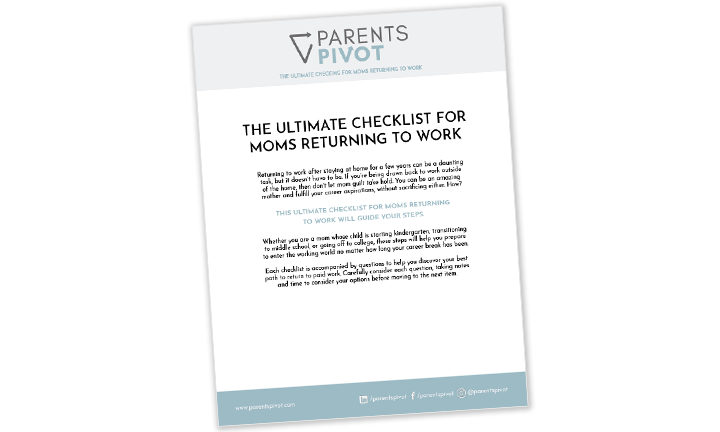When parents return to the workplace, they often worry about how their children will adjust. Children can struggle with the changes that come with a parent’s return to work, but it doesn’t have to be this way. And just like many skills you acquire in motherhood, you can ease the transition by using coaching skills that will easily transition to the workplace.
Today, let’s talk about how to ease your children into their brave new world while adding valuable coaching skills to your resume. Here is a four step process to use as the backbone for helping your children and sharpening your skills:
Broaching the Topic
First, tell your children that you plan to return to paid work. Explain your “why” for returning to work. Adapt your approach for your specific children, keeping their unique personalities in mind Plan a good time to talk to them and make your message gentle and clear. Be ready for questions and prepare to answer openly and honestly. Transparency during this process will only help strengthen your relationships with your children and build trust in the process.
Managing Expectations
Help your children understand what this transition will look like for the family. Come prepared to talk through the upcoming changes. Explain to your children what new responsibilities they may have. Will they need to begin doing their own laundry? Will they ride the bus to school instead of being dropped off? Will they need to help make dinner?
Maybe your return to paid work will make their lives easier in some ways. Maybe they will get to spend more time with friends, or your return to work will mean you can afford the vacation your family has been talking about. Be sure to explain the changes, both difficult and enjoyable.
Be prepared for them to ask questions about aspects of the change you didn’t think of. That’s all a part of the natural process of dealing with change.
Addressing Fears
As you have this conversation and answer questions, children may bring up their fears and trepidations. This is a good time to be a coach to them. Tara Mohr recommends these five methods for addressing fears; you can also apply one or all of these to your children:
Create a Character: Work with your child to invent a fear character, either based on a character in a story or a completely new one. This character will represent fear. Role play this with your children, teaching them to talk to their fear and be in charge of their fear. For example, your child may practice saying, “Well, hello, Cruella DeVille. I see you’re here for a visit.” Practicing talking to a fear character will help them take charge of their fears.
Follow the fear through to the end game: This is the “so what?” game. While you wouldn’t want to diminish your child’s fear, play out the fear. If they’re afraid they’ll lose all their friends because of the change in schedule that comes with you returning to work, ask, “So what would you do then?” and help them figure out that they aren't losing their friends, but will simply be seeing them at different times during the week.
Ask, “Is it true”?: Many fears are irrational or overly self-protective. As your little ones are learning to manage this, help them practice asking if their fear is real. Assure them that there’s absolutely no job in the world that would make you love them less and that you’re still going to their soccer games on Saturday mornings.
Connect to love: Love and fear cannot coexist. So, help your child connect to something that reminds them of love: a favorite song, an activity, or even remembering their favorite family activity. This practice will help them get past fear and overcome it. You can also purchase a teddy bear or book that allows you to record your voice. Your child can replay it, listening to your voice when fears emerge and you aren’t around.
Let fear be your traveling companion: If the tools above don’t work, teach your children to let their fear be part of their journey, much like a car that’s riding beside yours on the freeway. You know the car’s there; it’s in your peripheral vision. But, it’s not keeping you from getting to your destination, not touching you, not cutting you off. It’s uncomfortable, but not stopping you from getting to the destination, whatever that may be.
These five tools will help you to equip your children to manage their own fear during your pivot and during other stages of life transitions. Coaching is real-world practice that will give you confidence in the workplace. I encourage you to use your coaching skills any chance you get, with family and friends too.
Following Up
As you make your way through the process of returning to paid work, follow up with your children and continue coaching them. Use your coaching skills, have open dialogue, and actively listen. As time passes, your children’s emotions will develop and change. They are more resilient and adaptable than we often give them credit for. But even so, following up often is important to coach your children during this big life transition.
As you transition back to paid work, it’s less stressful when your children are adjusting well to their new lives. As you make progress toward your goal, check out these helpful resources. If you need additional support, we’re here to help.



